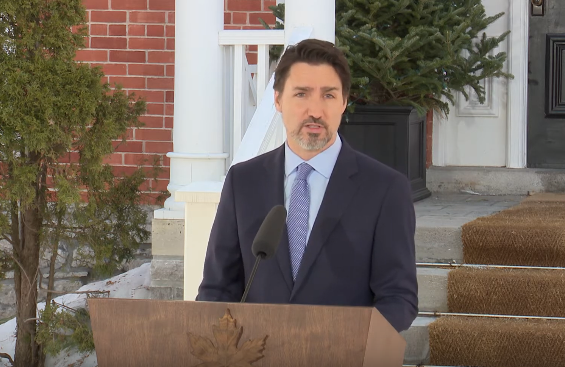The Canada-US border will likely close overnight Friday, Prime Minister Justin Trudeau said Thursday.
"My understanding is that the measures will probably come into place in the night between Friday and Saturday, so in about a day and a half," said Trudeau, speaking from outside his Rideau Hall home in Ottawa, where he is in self-isolation after his wife Sophie Gregoire Trudeau tested positive for COVID-19.
On Wednesday, Trudeau announced a joint agreement with the United States to temporarily close the border to all non-essential travel in an effort to curb the spread of the coronavirus, while ensuring the flow of critical goods and people who cross the border for work.
Currently, the Canadian and US governments are working on "fine-tuning" that agreement, he said.
Trudeau also announced Wednesday an $82-billion dollar COVID-19 aid package, which includes wage subsidies and income supports, boosts to the GST and child care benefits and extensions to tax deadlines.
'A lot to take in'
Trudeau said the measures implemented could be in place for "weeks or months," as members of government follow the advice of medical experts.
"We've heard anything from weeks to months," he said.
"We know this is a difficult and extraordinary time in which Canadians are taking difficult and extraordinary measures. We will continue to do that until Canadians are safe."
Trudeau also acknowledged the speed of events related to COVID-19.
"We've seen significant changes and what it means for the country. Every day, we've had new updates for Canadians. We're moving fast because that's how we will protect Canadians and the country," he said.
"I know it's a lot to take in."
He also urged Canadians to support each other and look out for their neighbours, such as picking up groceries for those who can't go outside. Those who can, he said, should donate blood.
Trudeau also suggested checking in with frontline workers, such as hospital staff, pharmacists, grocery store clerks and truckers.
"I know that people are worried about the days and weeks ahead hold," he said. "There's no doubt these are uncertain times."
"But no matter what happens next, we can count on each other."
'Working hard to bring Canadians home'
Trudeau again urged Canadians abroad that it's "time to come home," adding that the federal government is working "very hard to bring (them) home."
The prime minister said he has been in talks with WestJet and Air Canada about how the government and airlines can work together to ensure there are flights available.
"We will continue to respond to the overwhelming demands of Canadians for support. We will be there to help them get home, as many people as we possibly can in the coming days and weeks," adding that it's a "difficult and exceptional situation."
As of Thursday, there are over 750 confirmed and presumptive cases of COVID-19 in Canada, including 9 people currently under quarantine at CFB Trenton after being repatriated from the Grand Princess cruise ship.
B.C. has reported seven deaths, and five people who have recovered. Both Quebec and Ontario have also reported one death from the coronavirus. Another five people in Ontario have also recovered.
Ontario and Saskatchewan have declared states of emergency, while Newfoundland and Labrador has declared a public health emergency.
In B.C., a public health emergency and provincial state of emergency were declared this week.
Both Richmond and Vancouver are holding special city council meetings Thursday to declare local states of emergency.
For more of our COVID-19 coverage, click here.



